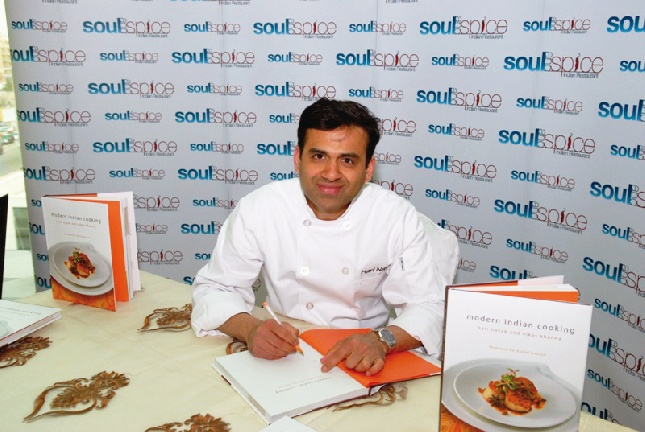A pioneer in presenting innovative, original, and passionate cooking, Chef Hari Nayak spreads the joy of cooking to Kuwait with the unveiling of Soul and Spice, his latest collaborative venture at the Marriot Courtyard.
“There is no love sincerer than the love of food” – these are famous words by George Bernard Shaw, also an underlying principle that Chef Hari chooses to live by. Striking an initial chord of dissent from traditional epicures, Hari has charmed his fans by offering an irresistible style of cooking focused on bringing the best of eastern and western techniques.
Living in the US for the last fifteen years unearthed a new following of culinary fanatics, earning Hari a reputation for being the one who brought Indian cooking home to so many fans unable to conjure the stimulating flavors of traditional Indian dishes in their modern kitchens. His unique approach to finally creating quick and easy delicious Indian recipes has earned him the title of seasoned chef, allowing Hari to pursue various successful ventures. Restaurateur, consultant and publisher, Hari’s passion and love for food have allowed him to train under legendary chefs like Albert Adria of El Buli and Marcus Samuelson of Aquavit, as well as partnering with chef Daniel Boulud to publish the widely celebrated cookbook,Modern Indian Cooking.
Breaking the mould from the traditional seemed to be an innate quality that Hari possessed since his early beginnings, as he started his culinary career making Masala omelets for his family at the tender age of five. Born in a small historic town in coastal Southern India, it was a challenge for Hari to break away from his roots to start his training at the premier Bukhara restaurant, learning the fine techniques of traditional Indian cooking. Looking internationally to further explore his talents, he chose The Culinary Institute of America in New York to widen his basic training as well as learn innovative approaches. According to Hari, “New York presented the perfect mix, the best of both worlds. Switching from Indian cooking, to just about every other cuisine opened up new doors for me as I’ve trained with the best chefs in New York.”
From 1996 onwards, Hari revealed a new style of cooking, and Indian food with a modern twist was a concept considered unheard of. Nonetheless, he persevered and believed that his passion for food would allow others to appreciate that there is more to Indian cooking than what traditional restaurants in the West had to offer. Not to confuse his technique with fusion cuisine, Hari insists that his style of cooking is still Indian yet modern. “The word fusion creates confusion! If not blended correctly, fusion cuisine creates an unpleasant reaction. With modern Indian cooking, the core traditional Indian elements remain intact yet they are updated. For example, basic Curry sauces are finer, and smoother in texture.”
Already providing culinary and consulting services to many organizational like Sodexo USA, ifood TV and many international restaurants, Hari also owns and manages America’s first ice cream patisserie. His culinary creations could be now sampled at Soul and Spice, where the innovative recipes published in his books are rendered using the finest ingredients. bazaar sits down with the famous chef in this exclusive interview.
Why did you become a chef?
I’ve always wanted to be in the kitchen with people, especially watching my grandmother in the kitchen; I was always by her side. Growing up in India, none of my family members were into cooking. Traditionally, growing up as a guy who wanted to cook was looked down upon; you were either to study to become a doctor or engineer, as was the case with my siblings. When I decided that this is something I wished to pursue full time, I went to a hotel and restaurant college after school at night.
What was your first big break?
My first break came with the success of publishing my first book, My Indian Kitchen, in 2006, which ultimately allowed me to venture into the restaurant business. I am so pleased that My Indian Kitchen was positively received, as it finally presented home cooks with a simple and modern guide to Indian cooking that wasn’t challenging, and didn’t require intimidating steps or complicated ingredients. Although many critiqued My Indian Kitchen for not being ‘Indian’, it was named as one of the Top ten books of the year by the LA times. I remember using seared scallops on the cover of the book, and this was shocking to the New York Times, as scallops are not available in India nor are they offered in any traditional menus in Indian cuisine.
How have you brought the innovative approach presented in ‘My Indian Kitchen’ to your new venture at Soul and Spice?
Soul and Spice is a true reflection of the techniques presented in My Indian Kitchen, where we’ve created recipes based on modern Indian cooking. Incorporating searing, grilling is a new direction that is very different from traditional stews. With Soul and Spice, we wanted to deviate away from perception that Indian cuisine is all about long cooked stews, yet it also involves other types of Indian cuisines. We have a great balance, traditional at its core yet fresh with modern techniques.
Would you say that Soul and Spice is more conditioned for the Kuwaiti market?
When considering international markets, we sometimes have to offer milder choices in our menu. However, we still ensure that the true flavors of our recipes are not changed. Consider the traditional Indian Samosas, these basic recipes haven’t deviated from the street Samosas you taste in Mumbai. They will always be quite spicy, bursting with heated flavors. However, in my restaurant in the US, we have created a roasted duck Samosa with Indian spices, and that is definitely different and conditioned for a Western market. Kuwait is such an exciting market, as people are aware of innovative tastes and enjoy sampling new kinds of cuisine.
Which dishes would you recommend for first time visitors to Soul and Spice?
Soul and Spice is a great first step for first time visitors as we have traditional dishes yet also innovative appetizers that will surely impress. Presentation, which is equally as important as taste, is a prime consideration. You eat with your eyes, after all. For instance, we’ve incorporated grilled scallops as an appetizer with innovative flavors like grape chutney and side dishes including Masala mashed potatoes. On top of presenting varied seafood options, we present updated recipes of traditional Indian dishes.
Who has been your biggest influence?
I’ve worked with so many talented and respected international chefs and this based on the path I chose to pursue non-traditional techniques. Learning to be grounded and acquiring professionalism from inventive chefs is an experience that teaches you to think differently. Daniel Boulud, for instance, was an inspiration to work with amongst many other talented chefs.
Why is your new book, ‘Modern Indian Cooking’, any different from ‘My Indian Kitchen’?
Modern Indian Cooking offers more approachable traditional recipes. By making the basics of Indian cooking techniques easy and applicable, entertaining for small parties and events can now include Indian recipes. Throughout the book you will notice that innovative party menus are available. People are always surprised that using European ingredients like olive oil and seafood can be considered as Indian cuisine. Modern Indian Cooking is infused with recipes from southern India, where ingredients are more tropical, including coconut based sauces and seafood driven dishes.
Which would you consider is your signature dish?
I believe this varies with the season because I like to offer something different. Still, I would have to say that the seafood-baseddishes are my favorite, as they are filled with southern and tropical flavors.
What is your greatest achievement to date?
I believe that my greatest achievement is living the life I have today and pursuing a career that allows me to travel the world, learn new techniques and create new recipes that add value to our traditions. Between publishing books, owning and managing restaurants and consulting, I’ve discovered that there is not one great achievement. Once you travel as a chef, as I normally do with consulting, you continue to grow. You can take any cuisine and take it to the next level as long as you stick to the basics and preserve its core elements, and if I could please a traditionalist with a modern recipe, then that is an achievement and a success!
If you could cook for anyone, who would it be?
I would say I’d like to cook for my mom, as she doesn’t ever get a chance to sample my food. She always cooks for me instead!
Find out more about Chef Hari by visiting: www.harinayak.com.








